Cookbooks
The Exploding Recipe
May 1978: Random House issued a recall of a cookbook, Woman's Day Crockery Cuisine, after realizing that one of the recipes "could cause a serious explosion."The recipe in question was for "Silky Caramel Slices." The problem was that it instructed people to heat an unopened can of condensed milk in a crockpot for four hours. A statement from Random House noted, "If the recipe is followed, the condensed milk can could explode and shatter the lid and liner of the crockery cooker."
What the recipe neglected to mention was that you should add water into the crockpot surrounding the can. Initially I thought you should open the can also, but my wife (who's heard of this technique of cooking condensed milk on a stove top) corrected me. You keep the can closed so that the milk doesn't boil out of the can.
Marilynn Marter, writing in the Chicago Tribune (May 25, 1978) explains:
The conditions that have made this underground recipe successful and therefore popular, especially with children, are water and temperature. By being heated in boiling water, the temperature of the can and milk do not exceed the boiling point. After a few hours of this, the sugared milk turns to a caramel pudding. In the Crockpot, however, especially without water, the temperature can build up rather like a pressure cooker. That was the most immediate cause of the problem.
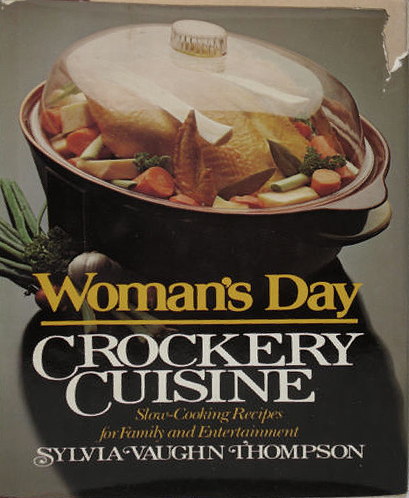
Front Cover
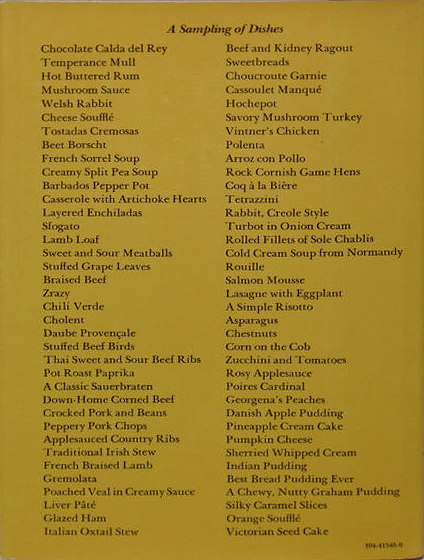
Back cover
The 'exploding' recipe (Silky Caramel Slices) is listed third from bottom, right-hand column.
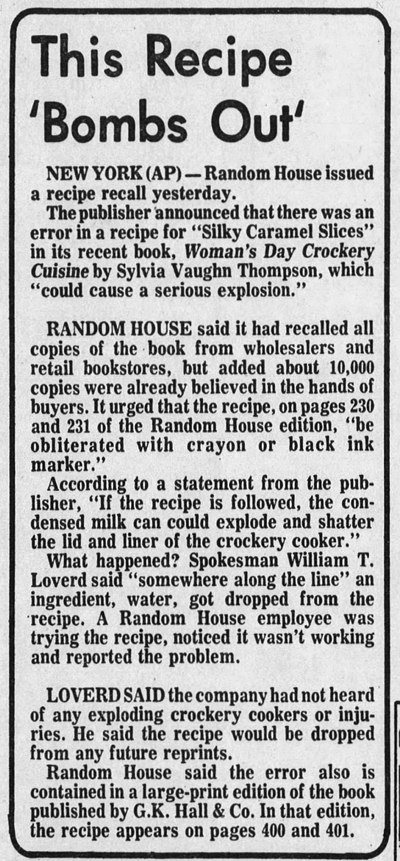
The Tennessean - May 9, 1978
Posted By: Alex - Thu Sep 21, 2017 -
Comments (3)
Category: Food, Cookbooks, 1970s, Weapons
Man-Pleasing Recipes
The title of this 1971 recipe book was somewhat misleading. It claimed to feature "Man-Pleasing Recipes," but really it was a collection of recipes featuring rice as the main ingredient. The booklet was put out by the Rice Council for P.R. purposes. Part of an effort to promote rice as a manly food.Can't say it succeeded. When I think of foods traditionally perceived as "manly," rice isn't one of the things that comes to mind.
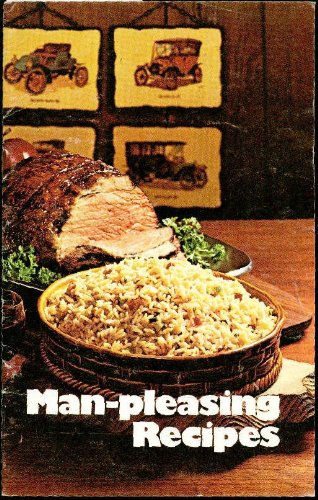
source: Amazon.com
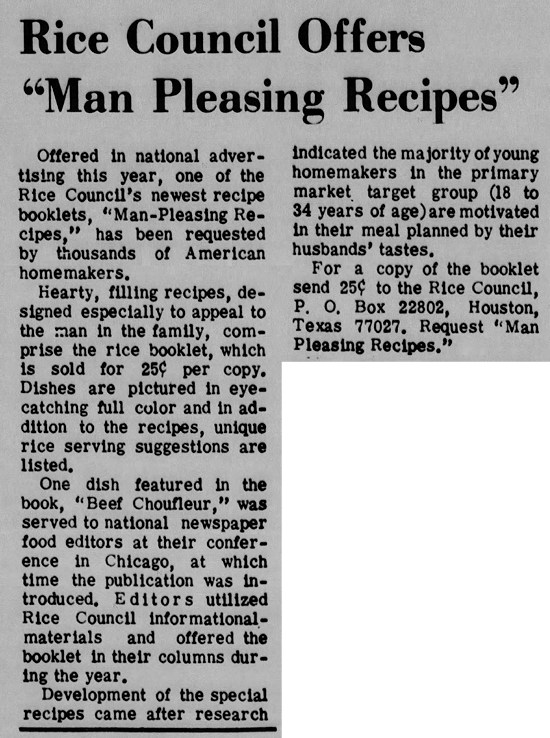
The Liberty Vindicator - Sep 7, 1972
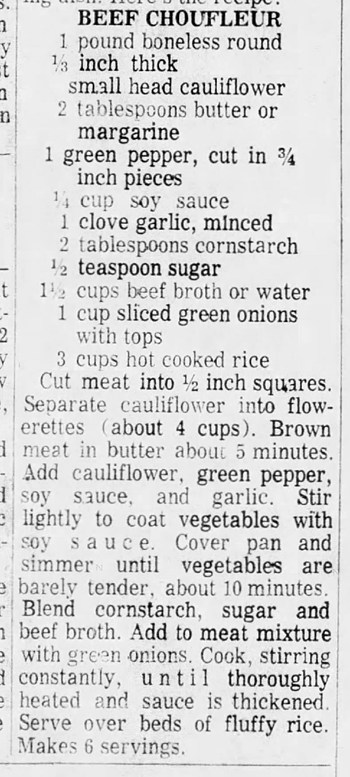
One of the "man-pleasing recipes"
Shreveport Times - Oct 14, 1971
Posted By: Alex - Mon Jul 17, 2017 -
Comments (3)
Category: Food, Cookbooks, Books, 1970s
Recipes for Cooking Muskrat
How the U.S. Fish and Wildlife Service came to publish a muskrat meat cookbook: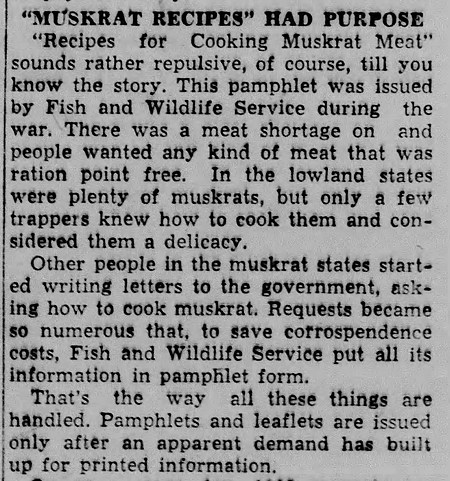
The Escanaba Daily Press - Mar 22, 1949
The recipes include Wine-fried Muskrat, Muskrat a la Terrapin, Maryland Shredded Muskrat, Muskrat Salad, Muskrat Pie, Pickled Muskrat, and Stewed Muskrat Liver. However, it doesn't include Cream of Muskrat Casserole, a delicacy that we posted about back in 2013.
You can read or download the full booklet at archive.org.
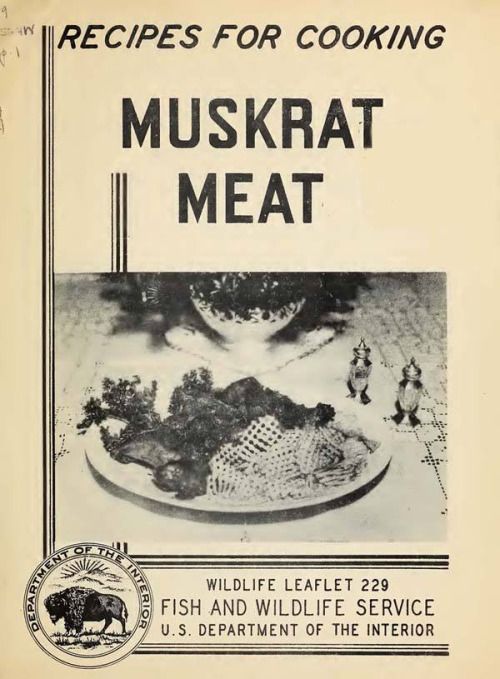
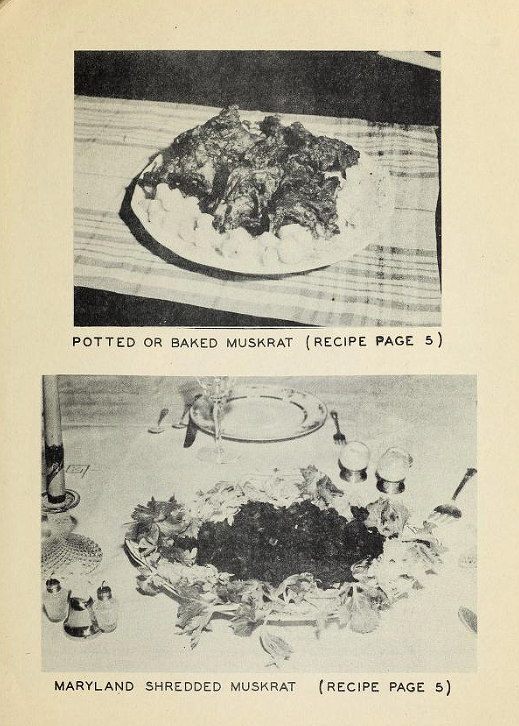

A muskrat - via wikipedia
Posted By: Alex - Thu Jun 15, 2017 -
Comments (4)
Category: Animals, Food, Cookbooks
Butterflies in my stomach
Ronald Taylor, a professor of pathology at the University of Southern California School of Medicine, was an early promoter of an insect-based diet. In the 1970s, he published two books on the topic: Butterflies in My Stomach: Insects in Human Nutrition (1975) and Entertaining With Insects, Or: The Original Guide to Insect Cookery (1976). Some of the recipes in the books included:- Boiled cod with snail sauce
- Wasp grubs fried in the comb
- Moths sauteed in butter
- Braised beef with caterpillars
- New carrots with wireworm sauce
- Gooseberry cream with sawflies
- Devilled chafer grubs
- Stag beetle larvae on toast
The full recipe for Peanut Butter Worm Cookies is below.
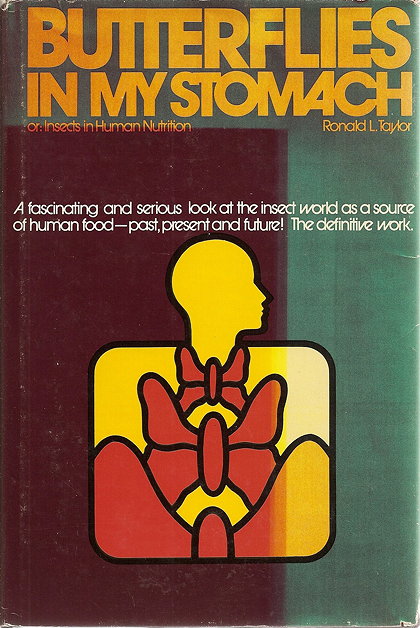
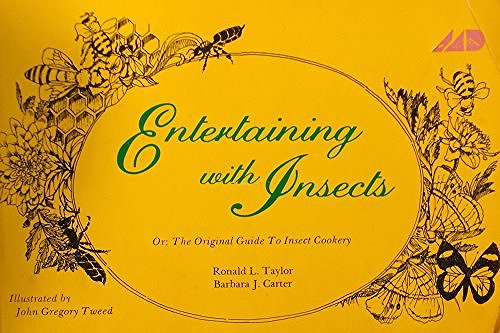
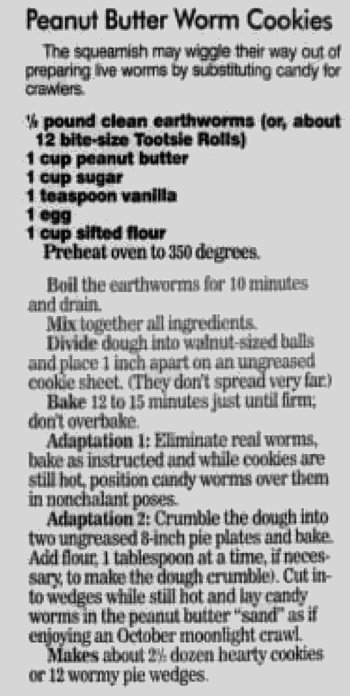
Posted By: Alex - Sun Jan 22, 2017 -
Comments (2)
Category: Food, Cookbooks, Insects and Spiders, 1970s
June’s Creation
A month ago I posted about the rice recipe that caused a woman to have a nervous breakdown.Summary: In 1989, Bobbie June Griggs submitted her rice recipe to South Carolina Electric & Gas's annual rice cookoff. She didn't win, but they published her recipe in their cookbook anyway. So she sued them, claiming its publication had caused her to have a nervous breakdown. For good measure, her husband sued also claiming "loss of consortium." The case almost made it to the Supreme Court, but they decided not to hear it, thereby letting the previous decisions stand. Those decisions were that: a) you can't copyright a single recipe, and b) "copyright law does not cover infliction of emotional distress." So Bobbie June Griggs was out of luck.
A few of you asked, what was the recipe? Thanks to the magic of interlibrary loan, I finally managed to obtain a copy of it, courtesy of the Charleston County Library, which sent me a photocopy of it free of charge. So here it is — the rice recipe that caused a woman to have a nervous breakdown.
I haven't made it yet, but I plan to try it out sometime in the near future. If any of you make it, let us know how it is, and post a picture of it.
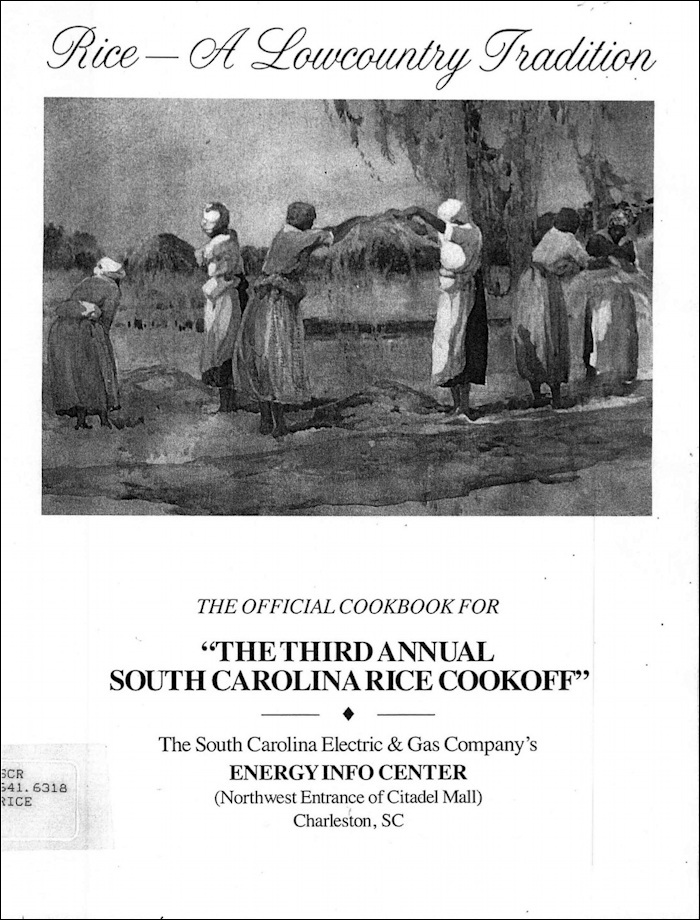
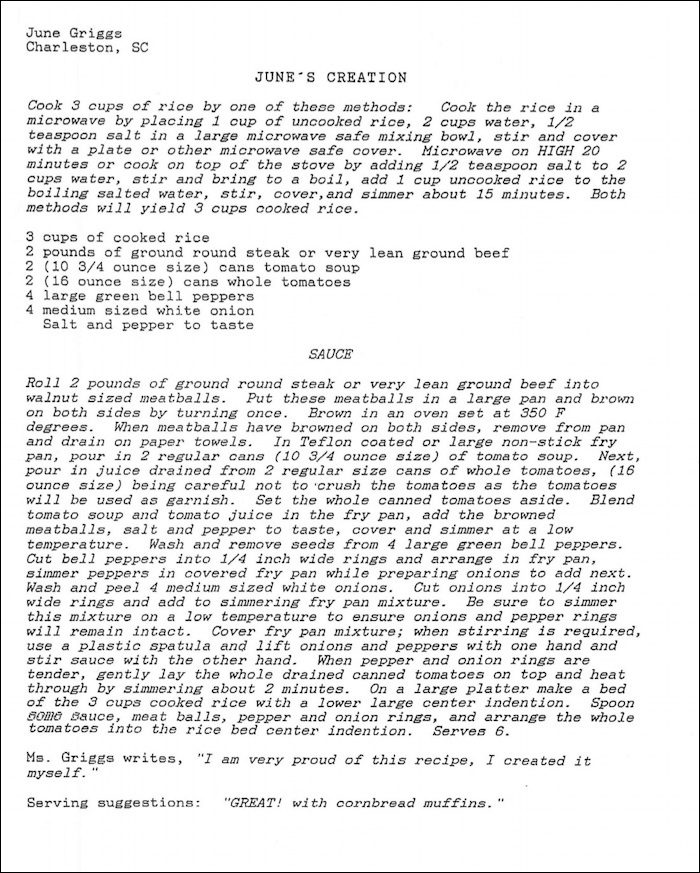
Posted By: Alex - Sun Jan 24, 2016 -
Comments (11)
Category: Food, Cookbooks, Lawsuits, 1990s
Rice recipe caused nervous breakdown
1992: Bobbie June Griggs sued South Carolina Electric & Gas, claiming that its publication of her rice recipe caused her to suffer a nervous breakdown. Her husband also brought an action for "loss of consortium."Griggs had entered her rice recipe in the utility's Third Annual Rice Cookoff in 1989. She wasn't picked as a finalist, but the utility nevertheless included her recipe in the cookoff cookbook (Rice, a lowcountry tradition: the official cookbook for the Third Annual South Carolina Rice Cookoff). This is what triggered the nervous breakdown.
The state court dismissed her case, noting that it was really a copyright case and thus belonged in the federal courts. In 1995, the state supreme court affirmed this decision (although one justice dissented). And it seems that Griggs tried to take her case all the way to the U.S. Supreme Court, because the AP reported in April 1996 that the Supreme Court also refused to hear her case, noting that "copyright law does not cover infliction of emotional distress" and also that you can't copyright a single recipe.
Her recipe, which she said she spent 10 years developing, involved canned tomatoes, meatballs, onions and bell peppers on a bed of rice. She called it "June's Creation."

Spartanburg Herald-Journal - Apr 23, 1996
Posted By: Alex - Fri Dec 18, 2015 -
Comments (10)
Category: Food, Cookbooks, Lawsuits, 1990s
Ezekiel Bread
The Bible contains only one full recipe, which is given to Ezekiel by God (Ezekiel 4:9):So you gotta bake it with human poop, which means it might not be to everyone's taste. Though God subsequently relented and allowed Ezekiel to substitute cow dung.
This was one of the recipes explored by the Rev. Rayner Hesse and Anthony Chiffolo in their book Cooking With the Bible (it came out in 2006), in which they set out to recreate the various meals and foods that appear throughout the Bible. Apparently they cooked up some Ezekiel bread, as an experiment, and Hesse said it tastes "like moldy bean sprouts." But he added, "You don't want to eat it. Never, ever. Let me emphasize that: Never."
Other treats to be found in the book include Locust Soup, and Locusts and Honey. More info at the LA Times.
Posted By: Alex - Fri May 29, 2015 -
Comments (10)
Category: Food, Cookbooks
Cooking with Poo
Her name is Poo, and she likes to cook. Would you like to cook with her? Or maybe just buy her book on Amazon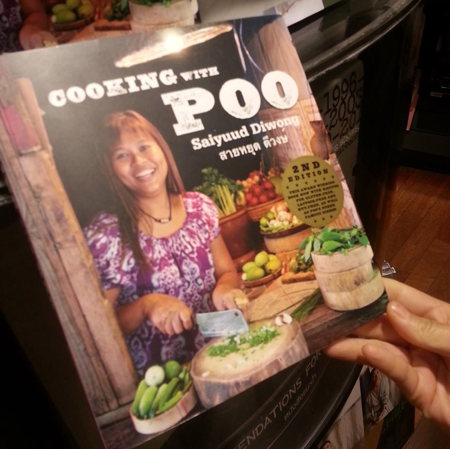
Posted By: Alex - Mon Oct 07, 2013 -
Comments (6)
Category: Food, Cookbooks
Chef Boyardee Recipes
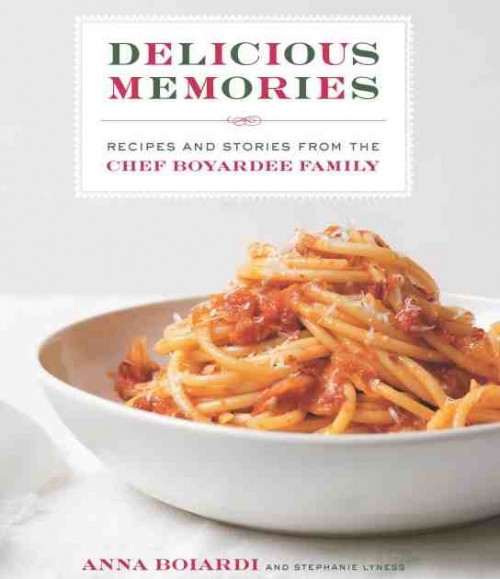
Every page has the same text.
1) Open can.
2) Dump in saucepan.
3) Heat and serve.
Posted By: Paul - Wed Jun 29, 2011 -
Comments (5)
Category: Food, Cookbooks, Books
Radiation Cookery Book
Back in March I wrote an article for Smithsonian magazine about pseudo-scientific terms that have gone out of fashion. For instance, it used to be all the rage to affix "electro-" to everything, as in "electro-lumps" (one marketers inspired term for coal).A term I definitely could have included in my article is "radiation." Once upon a time it didn't have the negative connotations it does today. Witness the "Radiation Cookery Book" from 1934. It didn't actually use radiation for the cooking (except in so far as heat itself is a form of radiation). Instead "Radiation" was the name of the company that made the gas cooker for which the recipes were designed.
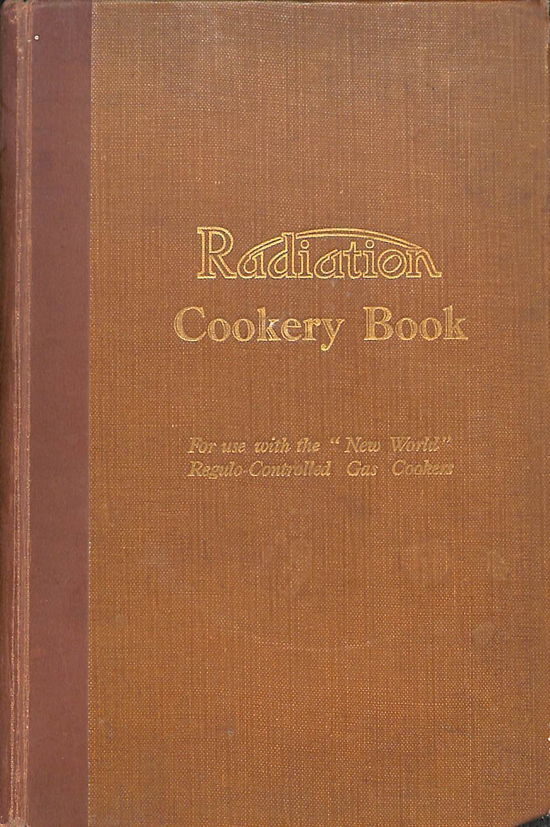
Posted By: Alex - Wed Jul 16, 2008 -
Comments (2)
Category: Fads, Food, Cookbooks, Science, Weird Names

| Who We Are |
|---|
| Alex Boese Alex is the creator and curator of the Museum of Hoaxes. He's also the author of various weird, non-fiction, science-themed books such as Elephants on Acid and Psychedelic Apes. Paul Di Filippo Paul has been paid to put weird ideas into fictional form for over thirty years, in his career as a noted science fiction writer. He has recently begun blogging on many curious topics with three fellow writers at The Inferior 4+1. Contact Us |




